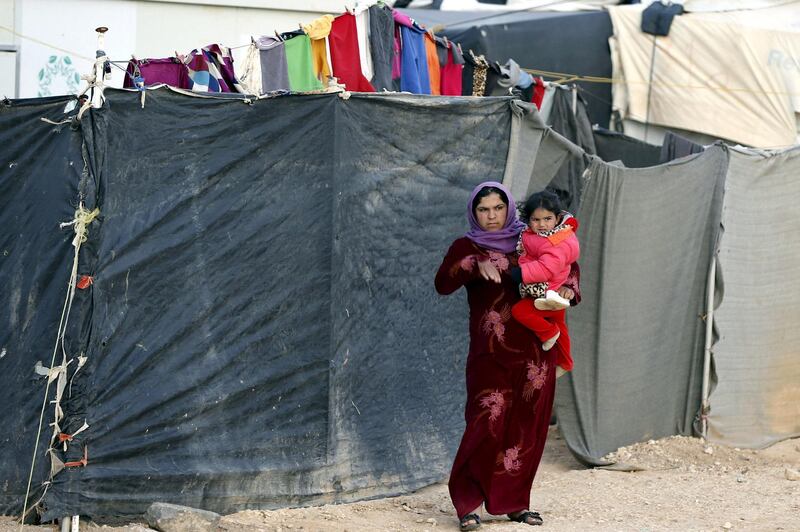A website to facilitate the donation of zakat money from Muslims around the world to help refugees in Jordan and Lebanon was launched by the United Nations High Commissioner for Refugees on Tuesday, and it is to be co-governed by the Abu Dhabi-based Tabah Foundation.
The foundation, a non-profit organisation that aims to enhance the welfare of Muslims worldwide, has worked to ensure the portal is compliant with Sharia and the requirements of zakat, the fourth pillar of Islam. It is mandatory for financially capable Muslims to pay a percentage of their savings that have not been accessed for a year or more to those in need, with Ramadan an important time for giving.
The website's trial phase was launched around two years ago and has so far benefited 14,000 families in Jordan. US$2.6 million dollars was donated between September 2016 and December last year and by the end of this year, UNHCR is aiming to benefit 30,000 more families in Jordan and 30,000 in Lebanon.
“The situation of refugees globally is one of the biggest human tragedies of our time, with more than 22.5 million refugees, 40 per cent of which are in the MENA region,” said Houssam Chahine, head of private sector partnerships for UNHCR in the MENA region.
“Since Muslims make up the majority of today’s refugee populations, the zakat initiative comes timely to secure life-saving humanitarian assistance to refugees in need.”
There are 748,543 “persons of concern” in Jordan, mostly from Syria, while Lebanon is home to more than a million Syrian refugees. They are the primary recipients of the project because they are considered the most vulnerable.
UNHCR is the first major agency of its type to provide an efficient, trusted route for people to fulfil zakat obligations.
Al Habib Ali Al Jifri, chairman of the Tabah Foundation and a renowned Islamic scholar, commended UNHCR on their co-operation and willingness to meet Islamic needs. "Tabah has not only provided fatwas but it has also agreed with UNHCR to co-govern the process to ensure that Sharia principles are applied to the distribution of zakat. They could've said 'no, thank you, your role was over with issuing the fatwas' but they completely complied," he said.
"Through our work with them in the past year and a half, we have witnessed great commitment from them and cooperation with all of the conditions."
UNHCR has agreed to give the entire amount provided by donors to those in need and not take the any for the usual overhead cost.
The beneficiaries of the zakat digital platform are selected through home visits by UNHCR teams who thoroughly study the refugees’ situation to ensure they are genuinely under the poverty line and have no other source of income.
“During the home visits, we assess their vulnerability,” explained Mohammed Al Hawari, senior communication and public information officer at UNHCR in Jordan.
“We use GPS to confirm the location of their home, to make sure they are not pretending to live somewhere else, then we then take pictures inside the house to assess the situation.”
The family is asked 75 questions in different formats to make sure they always give the same answer. The questions “contain more than 800 hidden elements to test vulnerability and make sure there is no fraud.”
An iris scan of the beneficiaries is then collected and stored in the cloud. And once they have been selected to receive aid cash they receive a text message instructing them to collect it from an ATM machine.
_____________
Read more:
[ Fasting in Ramadan: 'Don't break your fast with salty processed food' ]
Everything you need to know in Ramadan in the UAE
[ Workplace Doctor: Do non-Muslims have to work full hours during Ramadan? ]
_____________
“Receiving the SMS is a significant moment,” Mr Al Hawari said.
“One of the refugees said that when he showed his wife the SMS, she jumped for joy and took a picture of it with another phone to document the moment … They were able to buy fruits they had not seen in six years.”
The SMS and ATM concept also preserves their dignity, he said.
During the launch event for the portal, Mr Al Hawari shared the stories of a number of people who have already benefited from the programme. He gave the example of two young boys whose parents had both died and who were living with their ageing grandmother who could barely take care of herself.
“We spent more than half a day in their house. From the beginning to the end of our visit, we did not find anything the children could eat in the house,” he said.
“A program like this is the only way to not only preserve the dignity [of families like this], but to also keep them living.”







